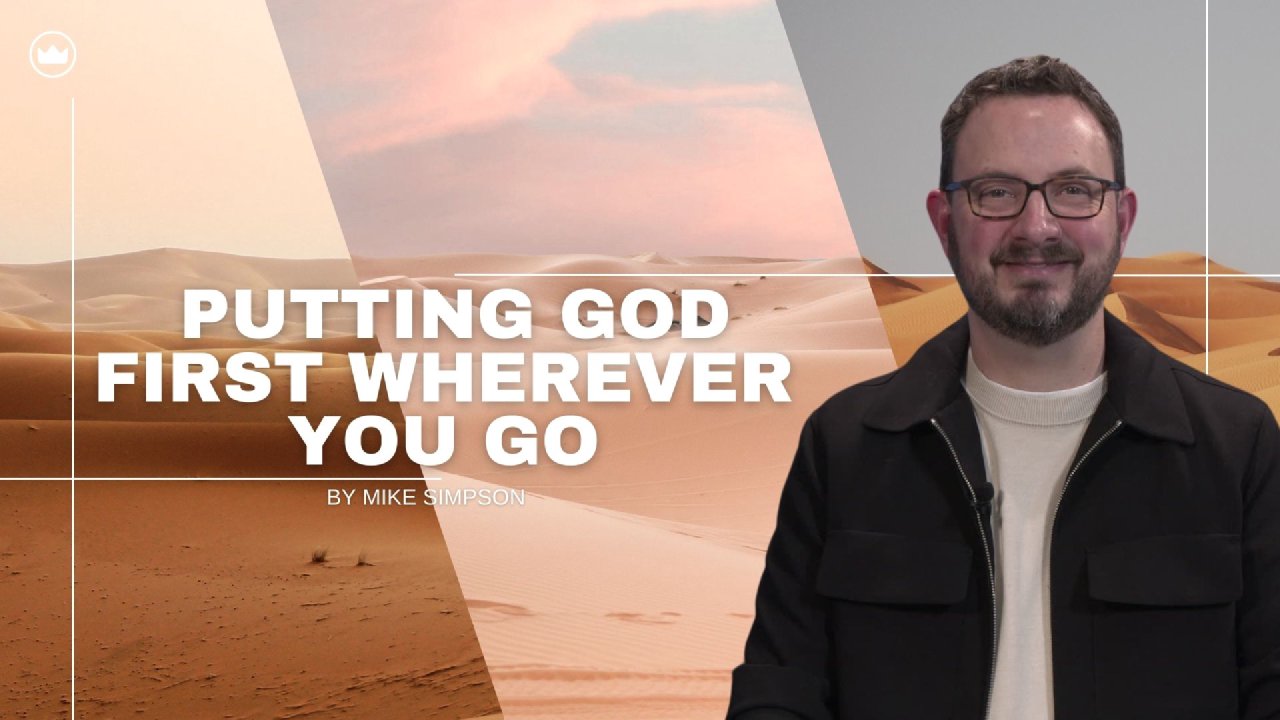God is interested in you! He has great plans for you which you will discover as you learn to put Him first wherever you go. Abraham was a man who always put God first wherever he was and in whatever situation he was in.
Abraham travelled extensively throughout his lifetime. He travelled 700 miles from Ur to the borders of present-day Iraq, then 700 miles into Syria, another 800 miles to Egypt, and then back into Canaan which is part of present-day Israel. Just as he travelled up and down mountains and valleys, his life was full of highs and lows. But he always put God first. How do we know this? Because we read many times in the Bible that ‘he built an altar’. An altar is a place to meet with God. Where are your altars? Where do you meet with God?
Abraham was going into a land of vision, of promise, of discovery, with great promises, but the reality was that he would be in a hostile culture and environment. He would need to really put a stake in the ground wherever he went. That stake was called building an altar. This was all about his devotion to God. Abraham knew that building an altar was not an add-on or something that can be dropped in times of pressure. It was his priority; it was essential and foundational.
Each altar was a declaration that ‘I am going to put first things first. I am going to seek God first for me and my house by building an altar.’ In Genesis we read about four altars that Abraham built and we can learn from each one of them. Abraham built:
1. An Altar of Praise (Genesis 12:2-3,7; Job 1:21b)
2. An Altar of Prayer (Genesis 12:8; Jeremiah 33:3; Genesis 12:13)
3. An Altar of Peace (Genesis 13:8-9; Philippians 4:7)
4. An Altar of Provision (Genesis 22:7-9; Hebrews 11:19; Genesis 22:14; Matthew 6:33)
Apply
1. An Altar of Praise. Abraham built this altar to honour the Lord as a response to God’s promises to him (Genesis 12:2-3,7). Abraham praised God before he did anything else, and he thanked God for His promises. Praising God should be the first thing we do every day and by thanking Him for His promises to us, we remind ourselves that it is only through the power of the blood of Jesus that we will conquer in every situation. Abraham had just been given huge promises from God, so of course he felt like praising Him. But what about when things are not going well? Recent neuroscience studies have discovered it’s impossible for the human brain to experience feelings of anxiety and gratitude at the same time. When Job was told that his family were killed, he still worshipped God (Job 1:21b). Worshipping God is a choice, and the best choice we'll ever make. Whatever you are going through, remember that praising God is your weapon. When you praise God, you gain His perspective and you will receive your breakthrough. The altar Abraham built would have been a simple stone structure which would have remained standing for generations to come. Every time Abraham saw it, he would have been reminded of God’s promises to him. There will come a day when that test you’re going through right now will become your testimony of God’s faithfulness and goodness to you. This is why it is so good to keep a prayer diary or create an annual dream board which you can look back on to remind yourself of the promises God has spoken to you and the answers He has given you.
2. An Altar of Prayer. Abram moved on from the lowlands of Canaan to a mountain (Genesis 12:8). Just as a phone call is a two-way conversation, so It’s the same with prayer. When Abram ‘called on the name of the Lord’, he would have been expecting answers. When we pray, we need to allow time for God to speak back to us. He often does this through the scriptures which is why our daily Bible readings are so important (see the free KCI App). We need to make prayer our number one priority. Are you taking time every day to meet with God by reading the Bible and praying? We read in the Gospels how Jesus frequently withdrew to be on His own with God because He knew this was the source of His strength. When you pray, it’s important to ask God what His plans are for you that day, not to use your prayer time to present your plans to God and ask Him to bless them (Jeremiah 33:3). Abram left the mountain to go down to Egypt to escape the famine, where he made the mistake of putting his wife in danger (Genesis 12:13). God was merciful and overruled Abram’s mistake, releasing him and his wife from Pharaoh. Abram then went back to where he had pitched his tent before and saw the stone altar he had made earlier. This caused him to call on the Lord in prayer again, but this time most likely in repentance. Whenever you make mistakes, it is only through prayer that you can be restored to the Lord.
3. An Altar of Peace. What causes you to lose your peace? Busyness, stress, conflict? Arguing and division broke out between Abraham’s herdsmen and his nephew Lot’s, and it got so bad that they could no longer live together (Genesis 13). Division in the home can affect every area of life. It can be totally consuming and remove all peace. Abraham took the lead firstly bringing rule and then offering a solution (Genesis 13:8-9). So, now he was free of conflict and able to experience complete security. It was here, that he pitched his tent, built an altar, and enjoyed the peace and presence of God. To keep your peace, you must seek to experience the presence of God daily and be touched by His presence every day. You do this by finding a place at home, your altar, where you can start every day in the presence of God. You must also have a family altar – a weekly time where you pray together as a family. Then you will live with the peace of God (Philippians 4:7).
4. An Altar of Provision. Provision and sacrifice are very much linked. Abraham, now over 100 years old, travelled almost 60 miles over 3 days with his son Isaac to the mountain in the region of Moriah. Abraham obeyed but also trusted God for provision (Genesis 22:7-9). When they reached the place God had told him about, Abraham built an altar there, arranged the wood on it, bound his son Isaac and laid him on the altar. Take note of the emotional weight in the situation. As Abraham constructed the altar on Mount Moriah, his heart likely experienced intense anguish. He was on the verge of presenting his only cherished son as a sacrifice to God, not just for slaughter but to be consumed by flames as a burnt offering. Despite Isaac being the promised heir, Abraham understood that God required this sacrifice, leading him to lift the sacrificial knife (Hebrews 11:19). However, what was anticipated as a moment of death transformed into a moment of victory. A substitute, a provision, emerged, and Isaac was spared. Abraham's faith had undergone a rigorous test, was ultimately rewarded, and God did indeed provide the lamb for the burnt offering. Nicky Gumbel said in his Bible in One Year commentary: "God sometimes allows us to be tested. Personally, I don’t think God ever intended for a moment that Abraham should actually sacrifice his son Isaac. The sacrifice of children was always an abomination to the Lord. But he wanted to establish Abraham’s priorities." It was here that God was first called Jehovah Jireh: God will provide (Genesis 22:14). Is God’s work your number one priority? When you sacrifice in your giving to God, He will provide (Matthew 6:33). God calls us to obey Him, and the blessings come out of the obedience. If you want your life to count, if you want to have an influence, then you and your house, like Abraham and his house, must say that 'we are going to give our absolute best’. Of course, the biggest sacrifice was made at the Cross by God who didn't spare His own Son but gave Him up so that we can not only be saved from our sins, but also come into a new line of blessing. Today, the challenge is to build an altar in our hearts to God, in our marriages and in our homes. Put God first wherever we are. Don't let God and the things of God get choked out. Put Him first and you will see every blessing.



